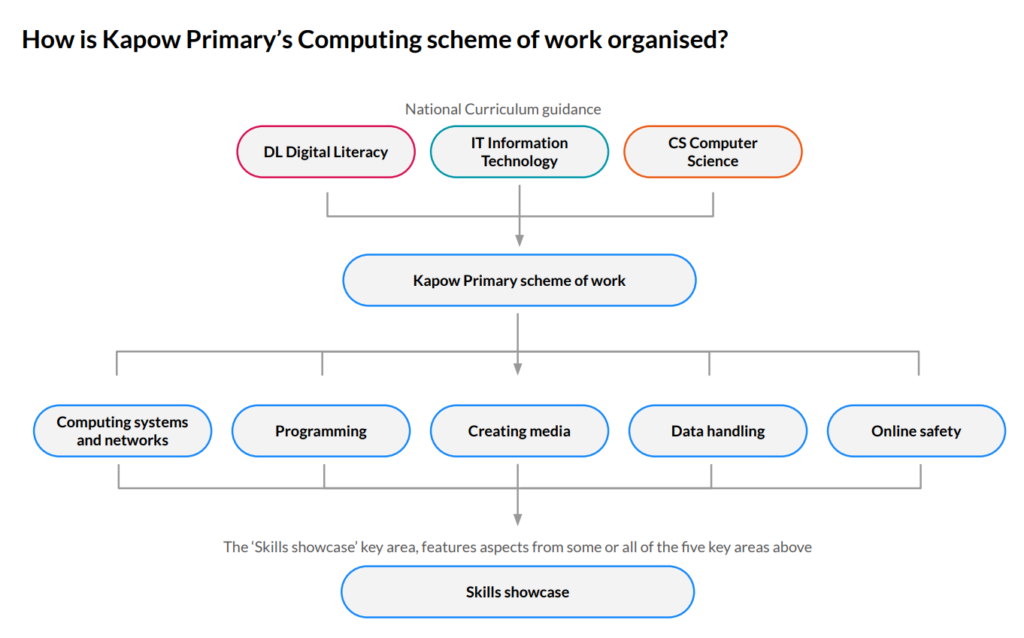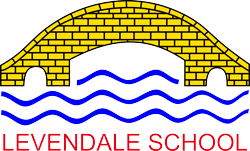Computing
Computing Curriculum Aims
At Levendale, our Computing scheme of work is designed to enable pupils to meet the expectations outlined in the National Curriculum and provide a comprehensive grounding in the fundamentals of computing, including e-safety.
Our Computing scheme of work is based on ‘Kapow’ alongside our Levendale curriculum goals and also links to the DFE’s Education for a Connected World framework, helping equip children for life in a digital world, including:
- developing their understanding of appropriate online behaviour,
- understanding copyright issues,
- being discerning consumers of online information
- and the healthy use of technology.
Online safety is a key focus across all of our computing topics and extends into other curriculum areas.
Whilst the Technology strand is no longer a specific area in the Early Years Framework (2021) we provide pupils with the opportunity to develop computing skills at an early age. These early experiences are built upon in year one.
Based on three strands (Digital Literacy, Computer Science and Information Technology), our curriculum strives to provide an engaging, fun, immersive and comprehensive set of experiences to best prepare children for life in an increasingly technologically-driven world.

Levendale Curriculum Goals: Computing
| Healthy and Safe | Our Computing curriculum ensures that children are fully equipped with the knowledge and skills they need to safely use technology. Children learn to keep their personal information private. They learn the actions to take if they are worried about anything they experience online. They are taught about their choices, how to digitally speak to others safely and the importance of their digital footprint. Children learn about ‘Childline’ and how they can be contacted if they are worried and stranger danger. Children learn how to spot the signs that someone is trying to find out their personal information. Children are taught to be are vigilant when using the internet, social media, apps and gaming platforms. Cyber-bullying is studied in detail and steps to deter this are learned in all age groups. Children follow school rules when using technology. |
| Positive Mindset | Children are taught strategies to develop a positive mindset, including resilience when using technology and using trial and error to solve problems. Children are creative when using technology and able to demonstrate their personality through their work (for example, when creating presentations). Experimentation is encouraged and pupils teach their peers new skills, developing their self-confidence and fluency when articulating about computing. Children learn how to care for their own (and others) mental health whilst using the Internet and social media (particularly in Upper Key Stage 2). Pupils use a variety of apps to complete coding tasks at different levels of difficulty and solve problems. The de-bugging element of coding is important to develop in computing coding. Challenges enable investigations, e.g. why something is not working correctly, allowing them to practise ‘trial and error’ sequences. They can then explain their reasoning for how the problem has been solved. |
| Respect | Pupils learn how to be respectful towards others online. They learn how relationships can be developed safely and respectfully through their interactions. Children study situations where behaviour is unacceptable towards others, linking to PSHE themes. Children learn how to ensure devices are protected and ready for future use. Children learn how computing can be a driving force when communicating with others. Pupils are taught about new technological advancements and how they impact the way we live our lives. They use technology to create digital presentations on how to protect the environment. Computing lessons are often linked to specific ‘Rights of the Child (UNICEF)’. |
| Independence | Children learn to confidently use the school technology (such as iPads and laptops), power on/off, sign in/out and use programs and email. Pupils are given roles within their class, which involve the managing and organisation of devices. Pupils learn how to use tablets and computer-based systems to perform processes and tasks. We ensure children become computer-literate, learning typing skills and using word processing, data manipulation, presentation programs and tools. Children understand how computing and technology can be used effectively in everyday life. Children support their peers to use technology. |
| Pupil Voice | Children have the opportunity to voice their opinions and discuss real-life contexts involving technology. Children learn who their ‘trusted adults’ are – people who can help them to feel safe. Presentations provide opportunities for the children to articulate their learning. Children have opportunity to use technology to represent their thoughts and views. Problem solving allows children to discuss strategies with one another and learn how to work together. |
| Aspirations | Children are taught to become ‘computer experts’ learning a wide range of skills when using technology. Children are inquisitive, developing their use of an expanding range of programs, apps and resources. Pupils are taught transferrable skills that they can use later in life. We strive to develop technological curiosity and provide pupils with fun, inspiring computing links within our curriculum. Computing vocabulary ensures children deepen their understanding in discussions. We develop children’s interests for using technology, for a wide range of different purposes. Computing is promoted across the curriculum. We aim to deliver a broad and balanced curriculum, supporting learning and providing children with the opportunity to try new things. Pupils learn about important role models in computing and how they have impacted positively to the rise in the use of computing, including in the past 30 years. Our inclusive computing curriculum progressively introduces knowledge, skills and vocabulary, with clear end points and expectations. |
Our whole school Computing programme provides progressive knowledge of:
Computing systems and networks
Identifying hardware and using software, while exploring how computers communicate and connect to one another.
Programming
Understanding that a computer operates on algorithms, and learning how to write, adapt and debug code to instruct a computer to perform set tasks.
Creating Media
Learning how to use various devices – record, capture and edit content such as videos, music, pictures and photographs.
Data handling
Ensuring that information is collected, recorded, stored, presented and analysed in a manner that is useful and can help to solve problems.
Online safety
Understanding the benefits and risks of being online – how eo remain safe, keep personal information secure and recognising when to seek help in difficult situations

